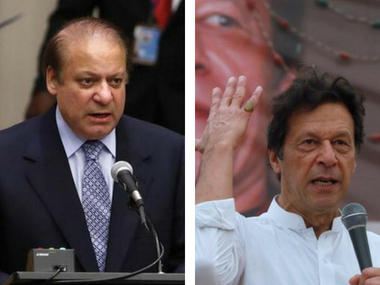The General Election in Pakistan is set to be held on Wednesday and the military’s game plan has gradually unravelled, with the latest example being the
disqualification and life imprisonment of PML-N’s Hanif Abbasi, who was supposed to contest on a key constituency of Rawalpindi. For Nawaz Sharif — an erstwhile poster boy of the military (when Benazir Bhutto was the common target), the year has been tough for him, as he faces life disqualification from holding public office and imprisonment. He has tried his best playing the victim card, but the massive
media crackdown and the alleged
forced defections of PML-N leaders make it difficult to conclude how the party will benefit from what Sharif
termed as “sacrifices”. While his fate seemed to be sealed with the emergence of both “Dawnleaks” and “Panamaleaks”, it took the military a calculated effort and sophistication to execute its plans to engineer the next mandate. In other words, the pre-poll engineering or what Sharif described as the role of “
Khalai Makhlooq” (aliens) has been in progress, becoming visible since last year onwards. What is peculiar this time is the military’s quest to prop up multiple favourites simultaneously aiming at a “malleable majority” in the National Assembly, with these parties acting as both allies, as well as checks and balances against each other. [caption id=“attachment_4797491” align=“alignleft” width=“380”] File images of Imran Khan and Nawaz Sharif. Reuters[/caption] Imran Khan has witnessed a meteoric rise in popularity in the last few months if recent opinion polls are to be believed. The Gallup poll had shown PML-N in the
leading spot (36 percent support as compared to PTI’s 24 percent) as late as in April. This tilted in
favour of Imran Khan by July, when another poll showed 30 percent support for PTI and 27 percent to PML-N, even though the latter appears to be leading in Punjab (which alone accounts for 141 of the 272 National Assembly seats). While tactical adjustments with the PTI may be coming out well for the time being, it does not seem that the military will be too enthused with PTI gaining a complete majority. Hence, it could be deduced that the PTI’s increasing challenge to the PML-N in Punjab could be checked by the newly-revived
Muttahida-Majlis-e-Amal (MMA). A
five-party alliance led by the Jamaat-e-Islami (JI) Jamiat Ulema-e-Islam (Fazlur Rehman faction) (JUI-F), the MMA seeks to regain its older mandate specifically in Khyber Pakhtunkhwa (KP), where it ruled between 2002 and 2008. While PTI’s victory in the 2013 KP elections and its aggressive forays into religious parties’ strongholds gave them a reason to unite, the fact that JI and JUI-F still secured
more votes than PTI in previous KP elections makes MMA a challenge for Imran. What emerges then is that the ideal arrangement for the military happens to hinge on having PTI with the largest number of seats, but still short of a majority. The gap will expectedly be filled by allies like the newly-formed
Grand Democratic Alliance (GDA) in Sindh, the
Junoobi Punjab Suba Mahaz (JPSM, a breakaway faction of PML-N dissidents in South Punjab) and the MMA (if the need arises) as neither PML-N nor PPP are expected lend support to Imran. In Sindh (which has 61 seats), the Pir Pagara-led GDA may manage to win a handful of seats since the PPP still remains the only party with
grassroot-level outreach in the province. In Urban Sindh (24 seats), where the Mohajirs face a tough choice between a fractured MQM-Pakistan (MQM-P) (led by Farooq Sattar) and the newly emerged Pak Sarzameen Party (led by former MQM leader Mustafa Kamal), the PPP, PTI and religious parties have seen this as an opportunity to exploit the situation. The
massive crackdown on MQM by the security agencies in 2016 (and its subsequent bifurcation into MQM-London and MQM-P), followed by rampant infighting within the MQM-P opened space for other parties to have hopes in Karachi, open up additional room for the Barelvi parties Jamiat Ulema e Pakistan, which had an electoral presence in Karachi in the pre-MQM era. In Balochistan (16 seats), the contest has become complicated with the emergence of the military-backed Balochistan Awami Party and MMA, which are expected to give a tough fight to the PML-N and Pakhtunkhwa Milli Awami Party (the latter two parties being allies). Nevertheless, a contingency plan is understood to be in the making if PTI is not able to gather the required support. This month, the Supreme Court took note of Asif Ali Zardari’s fake bank accounts case, but
restrained the Federal Investigation Agency from pursuing investigation till elections. Though a remote possibility, there are reasons to believe that the case could be used by the agencies to arm-twist PPP to support Imran, given the larger goal of keeping PML-N out at any cost.
The General Election in Pakistan is set to be held on Wednesday and the military’s game plan has gradually unravelled, with the latest example being the disqualification and life imprisonment of PML-N’s Hanif Abbasi
Advertisement
End of Article


)

)
)
)
)
)
)
)
)



